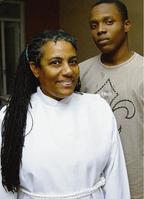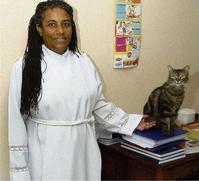Avia Collinder, Outlook Writer
Dr Rachel Vernon and her 15-year-old adopted son Demoy ... together they have raised four cats and a dog. - Photos by Winston Sill/Freelance Photographer
They may be considered the more spiritual sex, filling the pews of churches in pious numbers. Still, it is always a surprise when a woman turns away from the adoration of the male and the search for family to the bold and apparently lonelier pursuit of God and leading his flock.
Dr Rachel Vernon, deaconess and minister in the Anglican church, fills her priestly role with purpose and grace. Known to many as 'Deaconess Evie', the theologian and assistant minister at the St Mary the Virgin Church in St Andrew is also a radical.
During the recent Women's Day celebrations and anniversary service of the Women's Resource and Outreach Centre, the minister was urging listeners to take a more enlightened attitude to sex workers - of all genders.
She also encouraged members of the women's movement to continue working for equality, in spite of the shushing voices.
Reflecting on the fate of a female colleague who was rejected by her local community after qualifying as a priest and returning home, she recalled the years when priests were turned away based on the colour of their skin.
Colour issues

Dr Rachel Vernon with one of her four cats.
"If you imagine that colour issues are no longer relevant, you are living in a dream world." And, if you think that women have it all - you have definitely made your bed in fantasy land.
Her review of the Anglican Synod journal revealed, Dr Rachel Vernon said, that of 40 boards and committees in the local Anglican church, only four were headed by women.
Although 70 per cent of the church population is women, only the Mothers Union, women's auxiliary and two prep school boards were headed by women. "Even the high schools for girls are headed by men," Dr Vernon observed.
A child of the '60s, Evie was born in Worcestershire, St James, to Willie and Merle Vernon, who sent her to Mt Alvernia Preparatory School and then - hoping to steer her away from a career as a nun - moved her at the appropriate age to St Hilda's High School in Brown's Town, St Ann.
"They were a little worried because I was so involved at Mt Alvernia," Evie recalls.
Alas, her parents had already laid the groundwork for the woman she would become. Willie and Merle Vernon were community workers in the highest tradition, as were her aunts who were nurses and one - Dr Kathleen Vernon - El Hallawani - who was probably the first woman doctor in St James.
"The feeling was that you were supposed to look after people," Rachel Vernon asserts.
So, she was packed off to St Hilda's, but there she attended every available service on Sunday: Anglican services were at 7 a.m., followed by Roman Catholic services at 9:30 and then the Baptist hour at 11 a.m. Later, Rachel and her gal pals would head for Youth for Christ in the evening.
Escape boredom
Truthfully, in the cloistered atmosphere of the boarding school, the girls utilised every available opportunity to escape boredom, and much of it came with a Christian label.
But, Rachel loved it all and also became involved in the ISCF - Inter School Christian Fellowship. "I was influenced by Faith Linton and Sibyl Evans in the ISCF," she states.
Rachel and her friends were also involved in helping out at the nearby Home for the Deaf and Girl Guides.
"Because the teachers never thought I could give trouble I was good at April Fools," she admits. "Teachers believed me and would take off." Life was not just about good deeds. To Rachel, it was all fun.
The girls of St Hilda's were also involved in the current affairs debates of the time, engaging ministers of government who visited the school in the early '70s in debates on the merits of national programmes.
"We were brought up to feel at school that we could talk to anybody - to the prime minister or anyone," Rachel Vernon reflects.
Later, when she enrolled at the University of the West Indies, she naturally became embroiled in challenges made to the vice-chancellor in relation to student life.
"We were part of the '70s generation who heard the statement, 'you must become the change you want to be' - said by Marcus Garvey, and believed it," she reflects, noting also that all of this fitted in neatly in what her family believed - that everyone should work for community betterment.
A defining moment for her was the day she saw a women wearing the garb of deaconess teaching at the University Chapel. It was her 'aha' moment, as she realised that she could do this as well.
Ministerial calling
Rachel contemplated working part-time as a minister and, soon after completing the Natural Sciences degree at the UWI, enrolled at the United Theological College. Her ministerial calling, however, became a full-time one - with all other pursuits - done so on a comparably 'part-time' basis.
Her first posting in 1981 was at St Phillips Church in polarised Maxfield Avenue, where every street was enemy to another. There, the minister learnt true diplomacy while preaching Christ to everyone.
She also became hospital chaplain at the Kingston Public Hospital, (KPH) Victoria Jubilee Hospital and the Bustamante Hospital for Children. At KPH, she was introduced to the island's very first HIV/Aids patient, and cultivated an interest in the field which also led to more and more work with those affected.
Around 1987-1990, the deaconess took leave of absence from the diocese to teach biology and religious education at Kingston College, where she was significantly influenced by Sylvia Barber into really believing that boys - no matter their abilities - can all pass biology.
"She (Barber) conned us as staff into doing extra work which managed to challenge these boys into doing better."
The boys were also dragooned into school plays which, years later, several have admitted were to change their lives.
"When you think that someone cannot be redeemed, I remember Sylvia Barber and these boys," Rachel Vernon states.
Dr Vernon subsequently went to work with the Caribbean Council of Churches and did other contractual work relating to training in HIV programmes.
With AIDA - the Association of Development Agencies - she worked across the Caribbean region in the area of training and testing until her return to the United Theological College to complete her PhD, and where she currently lectures part-time.
Today, apart from being pastoral assistant at St Mary the Virgin Church, where she weekly incites her congregation, Dr Vernon is public education and advocacy specialist at Jamaica AIDS Support in Kingston.
At church she is a plain-talking diva of things divine. Rachel Vernon on the pulpit is first and foremost a storyteller, illustrating her pungent comments not only with stories from the Bible but with tales of situations faced by real people she meets every day.
"I am always in trouble," Dr Vernon admits.
"The church moves slowly and I am not always so patient. People who are more patient can do far more (in the church) than I have done."
Great influence
Still, she is thankful to Canon Ernle Gordon, who preached at her ordination and remains a great influence, mentor and guide.
Decades into her chosen calling of Christian service, Dr Rachel Vernon is pleased by the way life has turned out - in spite of the horrors along the way. She was once raped, she said, and - having gone to gender conferences - suspects that the incidence of rape in Jamaica is much higher than it is reported to be.
But, preaching tolerance towards all, and especially to the weak and vulnerable (including sex workers), she notes, "We throw stones, but we live in a culture which has no problem with business marriages. The truth is there are lots more people exchanging money for sex than we would like to think."
Dr Vernon lives at home with her 15-year-old adopted son, and one dog and four cats which they have raised together.
In the Lord, she has found a being worthy of passionate love.
Her guiding philosophy in life, she says, is 'God loves us; He loves us and chooses the best way for us even if it looks dark. He is the best way. I have proven that.
"His love is sustaining."

